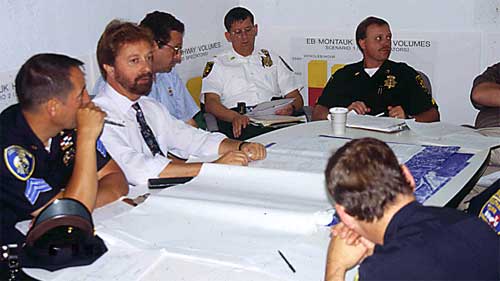
Managing Travel for Planned Special Events
Chapter Five. Event Operations
Planning
Page 1 of 4

Figure 5-1. Event Planning Team Meeting
Purpose 
This chapter presents advance planning and stakeholder coordination activities conducted for a specific planned special event. It represents the first of three successive chapters on the event operations planning phase. The primary, interrelated products of the event operations planning phase include: (1) feasibility study, (2) traffic management plan, and (3) travel demand management initiatives. This chapter describes initial planning activities, summarizes feasibility study analysis steps specific to a planned special event, and highlights external factors affecting the scope of event impact on transportation system operations.
Practitioners can use this chapter as a tool to: (1) establish an event operations planning framework for guiding stakeholder activities throughout the phase, (2) assist in deciding whether to grant or deny preliminary approval to schedule a proposed planned special event based on predicted transportation system impacts and (3) determine traffic and parking demand, roadway capacity deficiencies, and unplanned scenarios that define that scope of traffic management plan required (Chapter 6) in addition to the need for developing travel demand management initiatives (Chapter 7).
Introduction 
This chapter helps practitioners to hit the ground running on advance planning for a specific planned special event. Compared to Chapters 6 and 7 which detail strategies and tactics for mitigating the impact of planned special events on transportation system operations, this chapter emphasizes, with supporting example case studies, the importance of facilitating a planning structure, stakeholder coordination, and comprehensive event assessment in generating event planning phase products that completely and accurately guide operations activities on the day-of-event.
A section on initial planning activities describes input data requirements for analyzing the event impact and discusses scenarios linked to particular events that may require the development of a contingency plan(s). The section lists transportation system performance objectives, and associated facility-specific measures of effectiveness (MOEs), that satisfy the customer service requirements of event patrons and other road user classes. It presents an event operations planning schedule and lists various products of the event operations planning phase. The section concludes by examining situations necessitating public involvement, summarizing the feasibility study and traffic management plan review process, and identifying successful policies and agreements for managing and operating a planned special event.
The event feasibility study section presents travel forecast process strategies and considerations for estimating modal split, event-generated traffic demand, and vehicle occupancy factors. It reviews techniques for identifying a market area and directional distribution of event-generated traffic. The section reviews methodologies for identifying and evaluating the sufficiency of available venue parking supply based on event parking demand and existing conditions. It specifies traffic demand analysis and roadway capacity analysis strategies, including the application of various traffic modeling and capacity analysis tools. To provide a lead-in to the following two chapters on event operations planning, the section describes a toolbox of mitigation strategies for adjusting event traffic generation levels as well as increasing transportation system capacity.
This chapter concludes with an examination of external factors that may create considerable impact on transportation system operations if ignored. A feasibility study may not account for issues such as available resources, weather, concurrent road construction activities, and concurrent planned special events. These factors must be accounted for early in the advance planning process as well as in traffic management plans prepared for a planned special event. For example, given a particular recurring event, event patrons and non-attendee transportation system users may realize satisfactory system operations during one event occurrence, then experience an unacceptable level of service during the next event occurrence. Such incidents occur when stakeholders do not account for various external factors, through scenario-based response plans, early in the event traffic management plan development process.
Planned Special Events Traffic Management | Privacy Policy